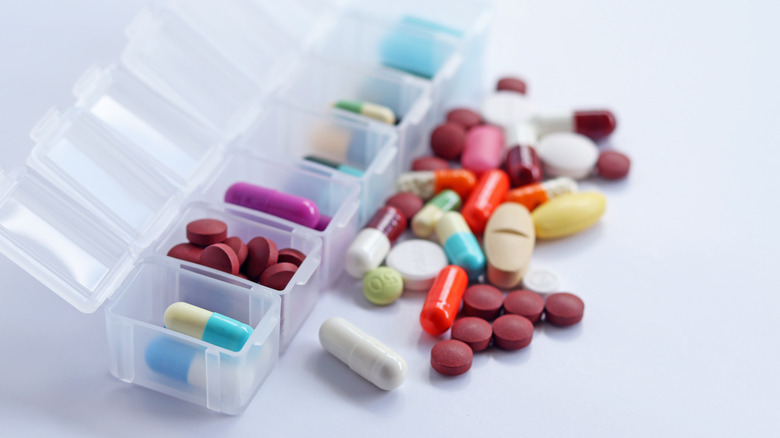The Rexulti Commercial Explained: Drug Uses, Side Effects, And More
Rexulti was originally designed as an add-on treatment for depression, but its most recent ad highlighted its new purpose. The ad begins with a simple conversation between a woman and her older mother, but then the tone changes as you see the two in silhouette, where the mother has an angry outburst. Rexulti (REX-ul-TE) can help treat agitation that might accompany Alzheimer's disease, the most common form of dementia.
The Food and Drug Administration approved Rexulti in May 2023 as the first treatment for agitation related to Alzheimer's. Rexulti was fast-tracked through the FDA approval process because the drug addressed an unmet need. More than 6.5 million people in the United States have Alzheimer's disease, an illness which has no cure. Because the disease progressively undermines the ability for people to live independently, many people with Alzheimer's must receive constant care. Agitation is the most costly and stressful symptom associated with Alzheimer's.
What is Rexulti and who does it treat?
Otsuka Pharmaceutical received FDA approval for brexpiprazole, the key ingredient in Rexulti, in 2015 as a treatment for schizophrenia and an additional medication for depression. People with major depressive disorder must also take an antidepressant for their condition. It's not known why the medication works to ease symptoms, but Otsuka Pharmaceutical believes Rexulti might partially activate serotonin and dopamine receptors in the brain to regulate mood. It might also work to block certain serotonin receptors.
Rexulti doesn't treat Alzheimer's disease. Agitation associated with dementia due to Alzheimer's disease is a specific diagnosis that affects about half of people with Alzheimer's. This agitation can manifest as verbal aggression such as screaming, emotional outbursts, or inappropriate language. Physical aggression might also be a part of agitation due to Alzheimer's, such as biting, hitting, or kicking. Hoarding, pacing, or repetitive mannerisms are symptoms of the restlessness associated with Alzheimer's-related agitation.
Rexulti's side effects
The most serious side effect of Rexulti is an increased risk of death in people with dementia-related psychosis. The drug has not been approved to treat this psychosis if it's not accompanied by agitation. The Food and Drug Administration issued a boxed warning for Rexulti, which is the strongest warning given for a drug.
There is also an increased risk of suicidal thoughts and actions, particularly in people younger than 24 years old. This possible side effect is more common as you start taking the drug or when your dosage changes. It's important to stay in touch with your doctor, noting any suicidal thoughts, worsening depression, insomnia, acting aggressively, anxiety or mania, or acting on dangerous impulses.
The most common side effects of taking Rexulti are weight gain, sleepiness, dizziness, cold symptoms, and restlessness. Some side effects, such as headaches or gastrointestinal issues, might go away after your body gets used to the drug. Other side effects, such as weight gain and restlessness, might endure while you're taking Rexulti.
Rexulti might cause other side effects, so you can head to Rexulti.com to find a more comprehensive list. If you have an adverse reaction, you can contact Otsuka America Pharmaceutical, Inc. at 1-800-438-9927 or the FDA at 1-800-FDA-1088 (www.fda.gov/medwatch).
If you or someone you know needs help with mental health, please contact the Crisis Text Line by texting HOME to 741741, call the National Alliance on Mental Illness helpline at 1-800-950-NAMI (6264), or visit the National Institute of Mental Health website.
Rexulti dosage and precautions
Rexulti is available in six strengths, ranging from 0.25-milligram tablets to a 4-milligram tablet. The most common dosage is 2 milligrams for depression, schizophrenia, and agitation related to Alzheimer's. You take the drug once a day, with or without food. Should you miss your dose, take it when you remember, unless it's close to the next dose. If that's the case, just take the next dose as usual without doubling your medication at one time. In case of accidental overdose, you can call American Poison Centers at 800-222-1222 or head to its website.
For people with agitation associated with Alzheimer's, the medication needs to be taken every day. In other words, it's not to be taken on an as-needed basis during agitation symptoms.
Alcohol can increase the side effects, such as dizziness or difficulty concentrating. Because Rexulti can make you drowsy, avoid driving a car or operating heavy machinery until you know how the drug affects you. While taking Rexulti, avoid getting your body too hot or dehydrated. This means avoiding excess exercise, staying inside during hot weather, and drinking water to stay hydrated.
Avoid taking Rexulti if you are on these medications
If you're taking CYP3A4 inhibitors (such as clarithromycin and erythromycin) or CYP2D6 inhibitors (e.g., chloroquine), your doctor might need to decrease your medication because they increase the concentration of Rexulti in your blood. If you're on CYP3A4 inducers (like phenobarbital), your doctor might need to increase your medication.
You don't need to change the dose if you're also taking certain medications like ticlopidine or omeprazole. Similarly, if you're taking other medications like dextromethorphan, lovastatin, bupropion, rosuvastatin, or fexofenadine along with Rexulti, you also might not need to adjust your dosage. Contact your healthcare provider to see if Rexulti might affect how your current medications work.
According to Drugs.com, the most commonly searched major interactions with Rexulti include:
- Duloxetine
- Fluoxetine
- Topiramate
- Sertraline
This isn't a comprehensive list, so you should check your current medications to see how they might interact with Rexulti.
How much does Rexulti cost?
The list price for Rexulti is $1,419 for a 30-day supply, but prescription drug plans usually pay part of most of the cost. People on Medicare could pay $21.37 a month depending on their plan, and those on Medicaid pay $2.88 a month on average. Veterans Affairs or TRICARE recipients could pay almost $60 a month on average, but expect to pay the full price for Rexulti if you don't have insurance. Rexulti doesn't have a generic option, so the lowest price on GoodRx is $1425.63.
If you have commercial insurance, you can sign up for a savings card through the Rexulti website. The average cost of Rexulti with commercial insurance is almost $26, but the savings card can provide the medication for free for two months and $5 for refills. Eligible patients with major depressive disorder can also receive their generic antidepressants for free through the savings card.
How does Rexulti differ from Abilify or Latuda?
Rexulti is a medication used to treat schizophrenia and is considered an add-on medication for people with depression. If Rexulti isn't an affordable option for you, you can consider Abilify (aripiprazole), which costs $9 for the generic medication. As an adjunctive treatment for depression, Abilify also treats Tourette syndrome, manic episodes from bipolar disorder, and irritability due to autism. Abilify has similar risks and side effects as Rexulti, and it comes in an injectable form as well as an oral tablet. Abilify can't treat agitation due to Alzheimer's disease.
An option to treat schizophrenia could be Latuda (lurasidone), which can also treat depressive episodes in people with bipolar disorder. Latuda shares some of the same common side effects, but Latuda might also cause back pain, muscle stiffness, or a runny nose. Latuda might also bring about a manic episode in people with bipolar disorder. The generic form of Latuda can cost as little as $12 for 30 tablets on GoodRx. Latuda also cannot treat the agitation caused by Alzheimer's.
Unfortunately, Rexulti is the only medication to treat Alzheimer's-related agitation.






